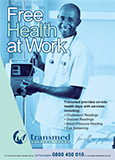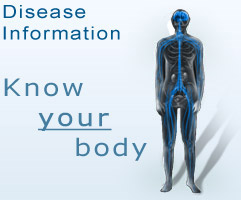Hypertension
What is hypertension?
Hypertension is the medical term used to describe an elevated blood pressure, commonly referred to as high blood pressure. Everybody has and needs blood pressure. Without it, blood cannot circulate through the body. And without circulating blood, vital organs cannot obtain the oxygen and nutrients that they need to work. Normal blood pressure falls within a range - it is not restricted to one set of numbers.
When the heart beats, it pumps blood to the arteries and creates pressure in them. This pressure (blood pressure) is a result of two forces. The first force is created as blood pumps into the arteries and through the circulatory system. The second is created as the arteries resist the blood flow. If you are healthy, your arteries are muscular and elastic. They stretch when the heart pumps blood through them. How much they stretch depends on how much force the blood exerts.
Your heart beats about 60 to 80 times a minute under normal conditions. Your blood pressure rises with each heartbeat and falls when your heart relaxes between beats. Your blood pressure can change from minute to minute, with changes in posture, exercise or sleeping, but it should normally be less than 140/90mm Hg for an adult. Blood pressure that stays above this level is considered high. Your doctor may take several readings before making a judgment about whether your blood pressure is considered to be in a high level range.
What do blood pressure numbers indicate?
- The upper (systolic) number represents the pressure while the heart is pumping.
- The lower (diastolic) number represents the pressure when the heart is resting between beats.
The systolic pressure is always stated first and the diastolic pressure second. For example: 122/76 (122 over 76) means systolic = 122, diastolic = 76. The systolic is usually the higher number.
What should your blood pressure level be?
The table below provides guidelines for what are considered normal and high blood pressure levels:
| Blood pressure category | Systolic (mm Hg) | Diastolic (mm Hg) | Follow-up recommended | |
|---|---|---|---|---|
| Optimal | Less than 120 | and | less than 80 | Recheck in 2 years |
| Normal | Less than 130 | and | less than 85 | Recheck in 2 years |
| High normal | 130 - 139 | or | 85-89 | Recheck in 1 year |
| HIGH | ||||
| Stage 1 | 140-159 | or | 90-99 | Confirm within 2 months |
| Stage 2 | 160-179 | or | 100-109 | Evaluate within 1 month |
| Stage 3 | 180 or higher | or | 110 or higher | Evaluate immediately |
IMPORTANT: Your doctor should evaluate unusually low readings.
What causes hypertension?
In 90% to 95% of high blood pressure cases, the cause is unknown. In fact, you can have high blood pressure for years without knowing it. That is why it's called ‘the silent killer'. When the cause is unknown, you have what is called essential or primary hypertension.
Factors that may lead to high blood pressure in the remaining 5% to 10% of cases, which are known as secondary hypertension, include:
- kidney abnormalities;
- a structural abnormality of the large blood vessel leaving the heart, called the aorta, existing since birth; and
- narrowing of arteries entering the kidney.
These problems can be corrected. For example, doctors can repair a narrowed artery that supplies blood to a kidney. Most of these problems can be ruled out by obtaining a thorough history, undergoing a physical examination and the taking of a few tests. Special tests are sometimes needed, but hospitalisation is not usually necessary.
How is blood pressure measured?
Blood pressure is measured using a medical instrument called a sphygmomanometer. A cuff is wrapped around a person's upper arm and inflated. When the cuff is inflated, it compresses a large artery in the arm, momentarily stopping the blood flow.
Next, air in the cuff is released and the person measuring the blood pressure listens with a stethoscope. When the blood starts to pulse through the artery, it makes a sound. Sounds continue to be heard until pressure in the artery exceeds the pressure in the cuff.
While the person listens and watches the gauge, he or she records two measurements. Systolic pressure is the pressure of the blood flow when the heart beats (the pressure when the first sound is heard). Diastolic pressure is the pressure between heartbeats (the pressure when the last sound is heard). Blood pressure is measured in millimetres of mercury, which is abbreviated mm Hg.
What is the effect of high blood pressure on your body?
High blood pressure adds to the workload of your heart and arteries. Your heart must pump harder, and the arteries carry blood that is moving under greater pressure. For example, if you put too much pressure in the tyre of a car, it will inflate to a certain point and then it will burst. Similarly, if the arteries are functioning at extremely high pressures, they may rupture.
If high blood pressure continues for a long time, your heart and arteries may not function as well as they should. Other body organs may also be affected. There is an increased risk of stroke, congestive heart failure, kidney failure and heart attack. When high blood pressure exists with obesity, smoking, high blood cholesterol levels or diabetes, the risk of heart attack or stroke increases several times.
What are the symptoms of hypertension?
High blood pressure usually has no symptoms. In fact, many people have high blood pressure for years without knowing it. It doesn't refer to being tense, nervous or hyperactive. You can be a calm, relaxed person and still have high blood pressure. The only way to find out if you have high blood pressure is to have it checked. A blood pressure test is quick and painless. It can be done in a doctor's office, hospital clinic, school, nurse's office, company clinic or at a health day.
A single reading showing high blood pressure does not mean you have hypertension, but it is a sign that it should be monitored carefully. If your blood pressure is normal, have it checked at least every two years. If your blood pressure is near the top of the normal range, or if you have a family history of high blood pressure, you are at higher risk. Your doctor will tell you how often to have it checked.
What is the treatment for hypertension?
Weight loss and lifestyle changes
Excess body weight is related to high blood pressure, and a weight loss programme is beneficial for lowering blood pressure and improving the effectiveness of medication for high blood pressure. Research has shown that weight reduction, even as little as 5 kilograms, reduces the blood pressure of an overweight person with high blood pressure. Weight loss, a low-salt diet and exercise definitely help to control high blood pressure.
Drug treatment
Treatment is varied and changing all the time, with new drugs appearing on the market almost daily. There are several classes of drugs which act on different areas of the circulatory system and result in control of blood pressure. The choice of drug is affected by many factors, among these being the presence of other chronic conditions. It is important to work closely with your doctor to find the appropriate medication for your particular case.
 TransmedBanner4.jpg)

